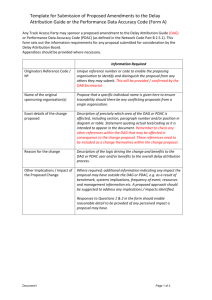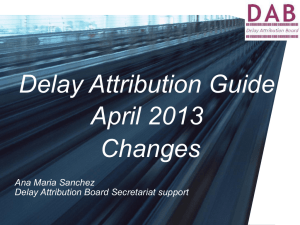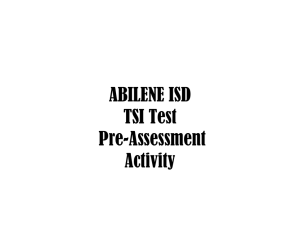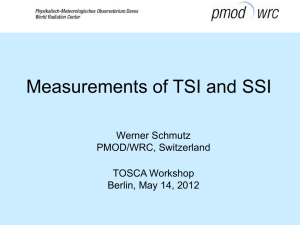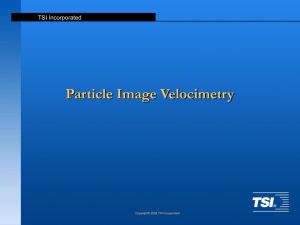Delay Attribution Guide April 2011 Changes
advertisement
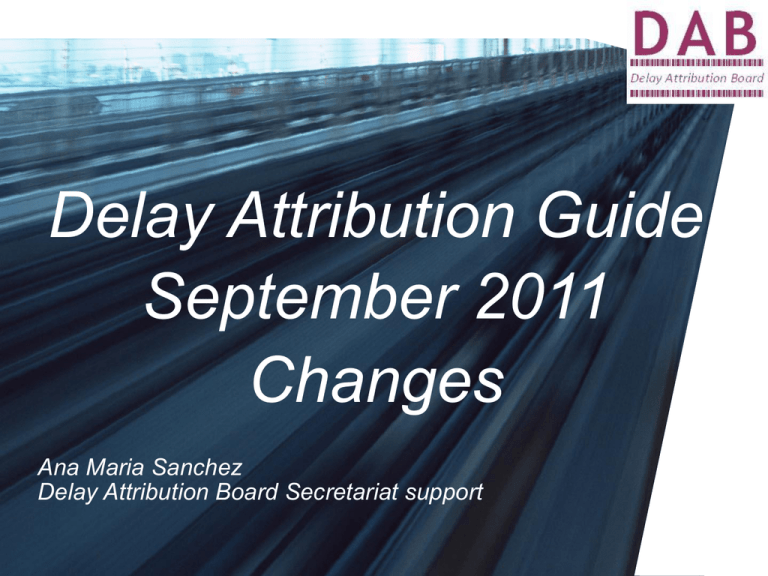
Delay Attribution Guide September 2011 Changes Ana Maria Sanchez Delay Attribution Board Secretariat support New Codes •1 new code has been introduced to the September 2011 Delay Attribution Guide (DAG) This code replaces code QD. Updates in sections 4.16.2 (g), 4.29.3(h) and Appendix A have been made to take into account the change noted below. CODE CAUSE JD Bridges/tunnels/buildings (other than bridge strikes) 18th September 2011 ABBREVIATION STRUCTURES 2 KEY AMENDMENTS •Section 3.2.8 P* Codes may also be used to avoid allocation of particular Minutes Delay and/or Reliability Events to either Track Access Party and hence exclude them totally from the Performance Regime. The codes PE, PG and PK are to be used, when a planned train cancellation does not have its schedule cancelled in the Train Planning System (TPS). All TPS cancellations are automatically coded PD. Staff entering schedules into TRUST/TSI must not use this latter code. The code PL is only to be authorised for use by Account Executives for specific Incidents (with Responsible Manager Code PH**) where the Train Operator and Network Rail agree to the exclusion of all delays and cancellations for that Operator only. If other Operators are affected then a separate Incident must be created for the Operator concerned. Suitable documentation must support each use of this code. . 18th September 2011 3 KEY AMENDMENTS • 4.31.2 All schedule errors contained within TRUST should be coded as follows (irrespective of Operator access request, as all schedules should be validated by Network Rail before uploading) • Note: A TSI enquiry will show whether the Schedule was set up by TPS or TSI itself. • If the delay cause is due to the Operator’s documentation not corresponding with the uploaded schedule(s) always provided that Network Rail’s response to the relevant access request by that Operator was made within the timescales laid down in Part D of the Network code then the codes FH for freight operators or TA for passenger operators should be used. • 4.31.5 Trains not cancelled in TRUST but which are planned should be allocated to Incidents with delay code PE/PG/PK, as appropriate, and Responsible Manager Code PQ**. The code PD is automatically applied to any schedule planned cancelled in TPS and should not be used in any other circumstances. • 4.31.6 A train cancelled via TPS and coded PD must not be reinstated in the system by any party, if the train is required to run this should be requested as a new train via the Very Short Term Planning procedure. 18th September 2011 4 KEY AMENDMENTS Appendix A updates ABBREVIATION CODE CAUSE PD TPS cancellation (not to be input in TSI/TRUST) TPS CANC QA WTT schedule/ LTP Process WTTSCHED QM Train schedule / STP Process STP SCHED QN VSTP Schedule / VSTP process (TSI created schedule) TSI SCHED The DAG has been updated to fall in line with the current name of the planning and process systems 18th September 2011 5 Any Questions? • We encourage you all to visit the DAB website at: www.delayattributionboard.co.uk • There you will find the latest copies of the DAG, FAG and competency standards and the latest outputs from the DAB Event held last May. • The web site is updated regularly with up and coming events and activities that the DAB are undertaking. • You can use the website to obtain the forms to make proposals for change to the DAG and PDAC as well as requests for guidance. • You can use the website to make suggestions on how to improve delay attribution on the whole. • You can email via the website, however, please do not use this facility to request specific attribution guidance – the request for guidance process is to be followed in these cases. • Feel free to email the DAB Secretariat on: admin@delayattributionboard.co.uk for clarification on process in regard to delay attribution/disputes. 18th September 2011 6
